#spawn of rovagug
Text
Spawn of Rovagug, Xotani
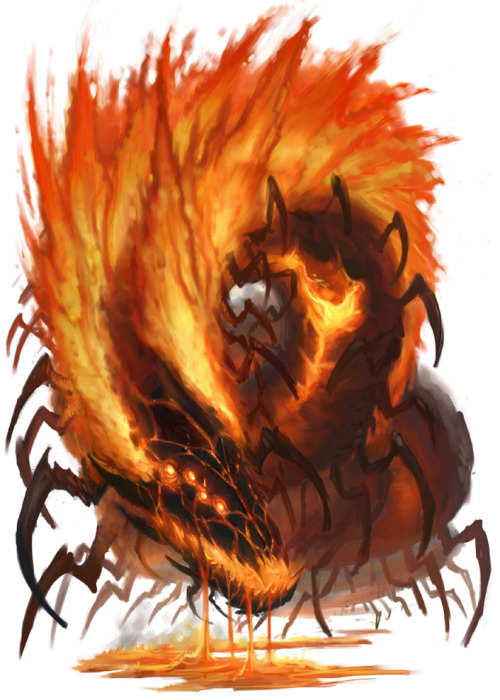
Image © Paizo Publishing
{Sponsored by @tar-baphon. Although I imagine that @monstersdownthepath will be happy to see it too, since they had to sort of average the 3.5 and PF2e statistics of Xotani. PF1e skipped it completely, maybe because it appeared in literally the last D&D 3.5 adventure Paizo published. I did run Legacy of Fire, and loved it. Personally, I made a few tweaks. Even if Jhavhul had succeeded, his consciousness was just going to be overwritten by Xotani; you don’t compromise with a Spawn of Rovagug. The sponsor asked me to adjust its CR up by 1, which was really only a matter of deciding how many HD to give it. Besides that, and the lava bombs borrowed from PF2e, this is a pretty straightforward conversion.]
Spawn of Rovagug, Xotani
CR 21 CE Magical Beast
This creature is a living magma flow, a cross between a wingless dragon and a centipede. It is the size of a building, jagged obsidian plates rising from its back and sides, and gouts of flames shooting from cracks in its surface and drool from its maw. It has eight empty eye sockets, but still seems able to see just fine.
Xotani the Firebleeder is the weakest of the Spawn of Rovagug, but this still makes it one of the most deadly creatures in Garund. When Xotani is awake, it avoids the sun. It finds sunlight blindingly bright and surprisingly painful, and so remains underground by day, creating a network of tunnels from its own burrowing and from the lava that it spews and leaks. By night, it emerges, setting everything ablaze in its path. It has no desires or intentions other than pure destruction, although it will consume the ashes of what it destroys as a mockery of natural predation. It does take extra damage from the touch of cold, but cold damage enrages Xotani more than dissuades it.
Xotani is an unstoppable force in combat, moving like a lava flow over anything that stands in its path. Its very touch sets combustible objects ablaze, and weapons turned against it melt into slag. Xotani’s main strategies are either breathing a torrent of fire over clustered enemies, or grabbing and swallowing a single powerful foe. Wounds that open in Xotani’s flesh spew magma reflexively, and Xotani can fire lava bombs from its back. Xotani is barely sapient, but knows enough to avoid using its breath weapon against foes that are immune to fire: these it just eats after softening them up with claws and teeth.
The Firebleeder was “slain” by a powerful order of mages millennia ago, and is currently slumbering beneath Pale Mountain in Katapesh, where the color of the rock is said to come from the crushed bones of those who died in battle. However, Xotani came very close to being awakened in the recent past. The lovesick Jhavhul, an efreet general, attempted to possess Xotani in order to have a form worthy of the object of his obsession, Ymeri the Queen of the Inferno. Without the twisted wishcraft used by Jhavhul, Xotani will not awaken for centuries. But it does now stir in his slumber, and droughts, wildfires and heat waves are more common around the Obari Ocean because of it. And plenty of other doomsday cults, misguided fire worshipers or simply bad actors may be able to wake Xotani yet.
Xotani the Firebleeder CR 21
XP 409,600
CE Colossal magical beast (fire, spawn of Rovagug)
Init +8; Senses blindsight 120 ft., darkvision 60 ft., low-light vision, Perception +26
Aura frightful presence (300 ft., Will DC 27)
Defense
AC 38, touch 6, flat-footed 34 (-8 size, +4 Dex, +32 natural)
hp 403 (26d10+260); regeneration 30
Fort +25, Ref +21, Will +20
DR 15/epic; Immune ability damage, ability drain, bleed, disease, electricity, energy drain, fire, mind-influencing effects, paralysis, permanent wounds, petrifaction, poison, polymorph; SR 32
Defensive Abilities heat, hibernation, supreme regeneration; Weaknesses cold, sunlight blindness
Offense
Speed 60 feet, burrow 40 ft., climb 60 ft.
Melee bite +32 (4d8+14 plus grab and 5d6 fire), 2 claws +32 (2d8+14 plus 5d6 fire)
Space 30 ft.; Reach 30 ft.
Special Abilities breath weapon (70 ft. cone, 1d4 rounds, 16d10 fire, Ref DC 33), firebleed, lava bomb, swallow whole (AC 26, 40 hp, 2d8+21 plus 20d6 fire), trample (2d8+21 plus 5d6 fire, Ref DC 37)
Statistics
Str 38, Dex 19, Con 30, Int 3, Wis 17, Cha 18
Base Atk +26; CMB +48 (+52 grapple, +68 overrun); CMD 62 (cannot be tripped)
Feats Combat Reflexes, Critical Focus, Greater Vital Strike, Improved Critical (claw), Improved Initiative, Improved Vital Strike, Iron Will, Lightning Reflexes, Nimble Moves, Power Attack, Staggering Critical, Stunning Critical, Vital Strike
Skills Climb +27, Perception +26, Survival +23; Racial Modifiers +8 Perception, +8 Survival
Languages Aklo (cannot speak)
SQ unstoppable force
Ecology
Environment any land or underground
Organization unique
Treasure incidental
Special Abilities
Blindsight (Ex) Xotani’s blindsight is based on hearing. If it is deafened, Xotani cannot use its blindsight.
Firebleed (Ex) As an immediate action upon taking at least 10 points of slashing or piercing damage, Xotani can spew lava from its wound in a 30 foot cone. All creatures in the area must succeed a DC 33 Reflex save or take 10d6 points of fire damage. Creatures that fail the save are coated in cooling sticky lava, being entangled and taking 5d6 points of fire damage for the next 1d3 rounds or until they spend a full round action to scrape the lava off. The save DC is Constitution based.
Heat (Ex) All of Xotani’s attacks deal an additional 5d6 points of fire damage, and any creature touching or striking it with a unarmed strike or natural weapon take that damage. A manufactured weapon that strikes Xotani is incinerated and destroyed; a magical weapon may attempt a DC 33 Fortitude save in order to survive. The save DC is Constitution based.
Hibernation (Ex) Spawn of Rovagug can sleep for years, decades, or even centuries and do not need to eat or breathe during these periods of dormancy, though they breathe normally and eat ravenously and almost constantly once they’ve been awakened. If a spawn of Rovagug is forced into an environment where it cannot breathe and would suffocate, it goes into hibernation until conditions are right for it to reawaken.
Lava Bomb (Su) Once every 1d4 rounds, Xotani can create lava bombs as a standard action. Treat this as a supernatural version of the meteor swarm spell (ranged touch +22, Reflex DC 27) with a range of 400 feet. The save DC is Charisma based.
Sunlight Blindness (Ex) Xotani’s light blindness is only activated by true sunlight.
Supreme Regeneration (Ex) All spawn of Rovagug possess regeneration, and no form of attack can suppress this regeneration; they regenerate even if disintegrated or slain by a death effect. If a spawn of Rovagug fails a save against an effect that would kill it instantly, it rises from death 3 rounds later with 1 hit point if no further damage is dealt to its remains. It can be banished or otherwise transported as a means to save a region, but a method to kill Spawn of Rovagug has yet to be discovered.
Unstoppable Force (Ex) A spawn of Rovagug can always charge, even if its movement is impeded or its path is blocked by another creature. It receives a +20 racial bonus on combat maneuver checks to overrun and Strength checks to break or destroy objects, and can make one such check as a free action as part of a charge. In addition, the natural weapons of a spawn of Rovagug ignore all forms of damage reduction and hardness.
106 notes
·
View notes
Text
Herald of Sarenrae: Sunlord Thalachos
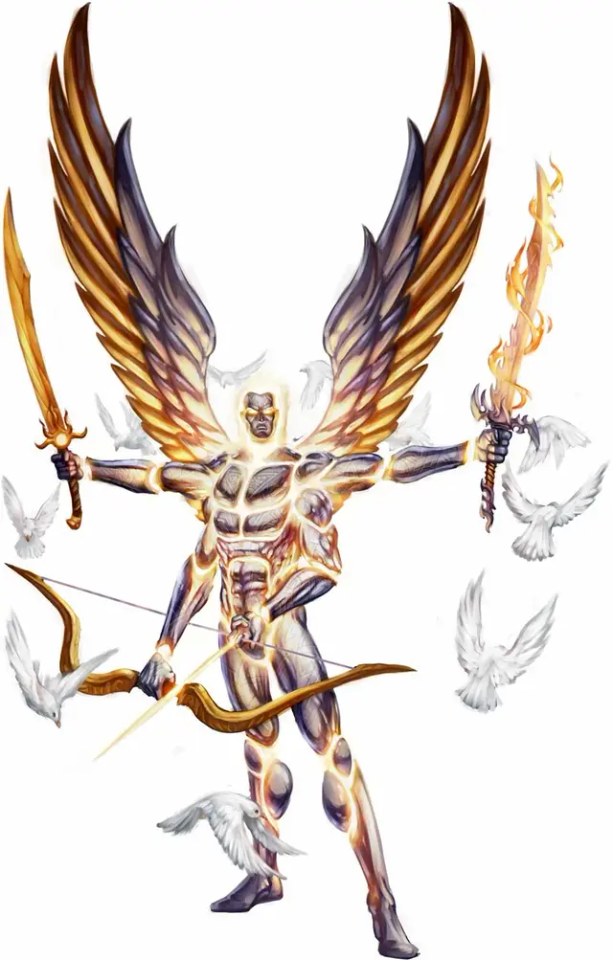
CR 15
Neutral Good Large Outsider
Inner Sea Gods, pg. 306
Ahh, here we go, a battle-ready Herald, specifically the Herald of Sarenrae, goddess of the sun, healing, and redemption. This platinum-skinned emissary of sunlight, however, has little to do with those latter two; while he can certainly be merciful and indeed possesses an array healing magic (mainly Remove Disease, Curses, and Fear--all at-will), the Sunlord primarily serves as Sarenrae's praetorian guard, protecting mortals selected by the sun goddess until they no longer require his guidance, often appearing to chosen wards at their birth to shield them from the machinations of the wicked until they learn to defend themselves. Able to not only become invisible at will, but freely change into the form of any Small or Medium humanoid or elemental creature, those tended to by Thalachos rarely ever know who their mysterious protector is (if they even know he's around), and almost never find out until long after he departs... if ever at all.
Interestingly, the purpose behind the Herald's creation is stated to be to serve as Sarenrae's weapon against the Spawn of Rovagug... but, well, I hope that's not literal, because the majority of the Spawn wouldn't even register his presence. I'm personally choosing to interpret it as him being charged with stopping whatever malefic machinations the cult of the Rough Beast is setting into motion to awaken one of the Spawn, because otherwise the Sunlord will need major backup in order to even inconvenience the weakest of the Spawn... or at least better weapons, since he can't even pierce their DR/Epic with his +1 Holy Flaming Scimitars!
But, before you go thinking he's some laughingstock in too far over his head, let me explain something to you: Are you familiar with the concept of hunting with the wrong weapon? For example, a normal shotgun isn't especially effective when hunting elephants, but if you were to instead shoot a squirrel, you'll obliterate the squirrel and likely a good portion of the terrain behind it. I say this to impress upon you the fact that the Spawn are the elephants, Thalachos is the shotgun, and the average cultist of Rovagug is the squirrel.
Before we get to how well he can peel apart a mortal, it's more than a little funny to me how good Thalachos is at getting rid of Evil Outsiders, a foe he was not built to face but nonetheless excels at removing. The Hand of the Inheritor--whom I must apologize to for continuing to punch at every opportunity--is devoted almost entirely to destroying demons, but Thalachos has frankly unfairly potent powers when it comes to combating all Evil, starting at the ability to cast Holy Word AND Dispel Evil at-will, the former capable of simply erasing hoards of lesser fiends and cultists with a single utterance and the latter capable of undoing the magic or the calling of whatever fiend Thalachos gets ahold of. He's got an unrestricted Plane Shift at-will to go wherever he pleases OR slap someone into another dimension with a single failed DC 21 Will save. He can use Sunburst 1/day to bring down Sarenrae's wrath upon an area, scouring it of Undead and any other creature vulnerable to sunlight, and call down a Flame Strike 1/day as well for additional artillery power.
if that wasn't enough, he's got Holy Smite at-will to squash whatever withstood his Holy Word... and perhaps, most blatantly wacky, the level 8 spell Holy Aura at will. NOT 3/day, or 1/day, or even 5/day, but at-will. Holy Aura can bless upwards to 15 creatures per casting with +4 to AC and to saves, 25 SR versus any spell cast by an Evil creature, full mind shielding, AND the ability to inflict permanent blindness against any Evil which strikes a protected creature in melee. He can do this at will, and everyone blessed by this maintains the blessing for 15 rounds.
do you guys think he'd be willing to go north for a bit? y'know, for fun?
All of these blessings are almost strictly for other people, though. Thalachos has no need for his own buffs, shielded by the universal Protective Aura of all Angels, improving both his and nearby allies' defenses against the weapons and magic against the forces of evil and hedging out hostile spell effects of 3rd level or lower (adorably, his aura also gives everyone inside Endure Elements so it's always comfortable). He's also fully immune to Fire, Acid, AND Cold damage, denying the three most common vectors of elemental attack by any creature, let alone fiends. Despite being Large size, he's also got Uncanny Dodge for some reason, which I imagine must look especially uncanny when the solid platinum titan suddenly bends 90 degrees at the waist to avoid an incoming spell.
All that defense helps him (literally) shine where he's most dangerous: In melee. It probably comes as no surprise that the 8ft tall flaming four-armed angel is a melee beater, and a resilient one at that. With an aforementioned at-will Invisibility, you may not know he's nearby until he slams down directly behind you, trapping you and all your friends in his 20ft threat radius. While certainly proficient with his +1 Flaming Holy Composite Longbow (2d8+6 + 1d6 Fire + 2d6 vs Evil), his true threat lays in melee, and not just for his damage.
He's got every Two-Weapon Fighting feat all the way to Greater, allowing him to make three attacks with his off-hand weapons while adding his full Str mod to the damage, already making his Full-Attack hurt; he's armed with two +1 Flaming Holy Scimitars which hit six times a round if he manages to Full-Attack. The meager 1d8+8 damage (+1d6 Fire + 2d6 vs Evil) belies their true effectiveness, because six attacks make the 18-20 crit range of his chosen weapons far more frightening than the low damage would suggest... and taking damage from two of his attacks in a single round forces a DC 24 Fortitude save versus being stunned for 1d6 rounds.
There is no cooldown to this ability or 24 hour immunity clause, and he can affect as many creatures as he can hit twice a round, potentially letting him stun up to three targets in a single round. Since being stunned has an obvious visual sign--the target drops everything they're holding and becomes woozy--the Sunlord is intelligent and insightful enough to drop aggro on whoever he's stunned to focus on anyone else in his melee radius to spread it around. Thankfully, this ability doesn't trigger multiple times a round for a single target, as it only checks the first time the target is hit twice. Taking all six hits doesn't trigger the ability 3 times, all the more reason he should diversify the directions he swings his swords.
Being stun-locked in melee with someone who can throw out so many attacks a round is never fun, and do you want to know what's worse? He doesn't need to Full-Attack to do it! He's a TWF guy, remember? If he moves up to you (50ft movespeed, 100ft fly) and does a simple attack, he can still hit twice, potentially cause a stun, and then do a Full-Attack next round instead to keep the chain going as long as he can.
I think all of this all very firmly puts him into the territory of "Tide-turning superweapon" that all Divine Heralds should be. He's a very high bar to clear, and very few do, hence why he caps off Holy Heralds Month. Fitting, I feel, for a central goddess such as Sarenrae.
You can read more about him here.
39 notes
·
View notes
Note
If no one has asked... Kingmaker?
Favourite Male Character: Harrim. He's just incredible. Continually putting out the Most Insane Comments ever. Thank you, king, for carrying my party in the Spawn of Rovagug battle and for never stopping the grind (spreading the word of Groetus)
Favourite Female Character: I can't choose between Nyrissa and Jaethal. They're just too good.
Least Favourite Character: Jubilost for the main cast. Rancid vibes and not in a way that's fun for me. Speaking of rancid vibes though: Irovetti is the choice for the non-main cast.
Favourite Ship: EVIL RULER/NYRISSA!! WE WERE ROBBED!! I can't stop thinking about what could have been between them and I think the tragedy of it all makes it all the juicier. Also Jaethal/female ruler is....Good.
Favourite Friendship: Octavia and Harrim have a really sweet relationship - she’s probably one of the only people who seems like...genuinely nice to him and cares about him.
Favourite Quote: Nyrissa saying that the reason she didn't recognise the intrusion in her dream straight away because it wasn't the first time she'd dreamt of Leonelle. Seer that into my brain.
Worst Character Death (if any): when Octavia or Regongar die in the most bullshit way if you only romanced one of them!!!!!
This made me so happy you have no idea Moment: Bartholomew pulling out a rare W during War of the River Kings after he'd been failing for so long and when I desperately needed him too.
Saddest Moment: the aforementioned House bullshit with Octavia and Regongar.
Favourite Location: in general, the First World is very pretty from an aesthetics standpoint, but fuck me I hate fighting there. I also quite like the Rushlight Fields, even if it feels like it's trying to kill my laptop lmao.
NAME A FANDOM AND I’LL DO THIS.
10 notes
·
View notes
Text
Blossoming Light (Cleric Archetype)

While the notion that a deity will provide protection from all harm is considered trite at best and outright suicidal or negligent of others at worst in the real world, there is a certain nobility to that level of faith, even if it is misguided. Sometimes “divine protection” takes the form of medicine and knowledge, folks.
However, in a fantasy setting where divinity is confirmable and divine protection undeniable, it can be a profound act of faith to eschew all other forms of protection other than those provided directly by their deity.
In the Lost Omens setting, the so-called “blossoming lights” first appeared in the wake of Sarenrae’s smiting of Gormuz. Horrified by the rift she had accidentally opened, allowing the spawn of Rovagug a path into the world, Sarenrae came to a survivor of her wrath and offered her divine power of protection, healing, and redemption, a start on the path of finding her own forgiveness for her short-sightedness.
Since that time, the practice has spread to other goodly faiths, and has become particularly popular among The Lantern Bearers, as their command of divine light makes them especially effective against evil drow and their minions, while also offering redemption to those drow seeking to escape the wickedness of the cruel civilization of their birth.
Even outside of that setting, however, the idea of faithful who eschew armor and shields in favor of relying entirely on their divine magic, being gifted powers of light and life in return can be quite appealing.
As suggested above, not only must these clerics be goodly servants and not be worshippers of evil deities, but they must also eschew armor and shields, their vows preventing their powers from being used for a short while if they use such things.
They also lack domain spells, though they still gain access to the other benefits of their domains. However, they are skilled in diplomacy to not only guide the goodly but also redeem the wicked.
In return for these restrictions, they gain additional uses of channeled positive energy. Additonally, when they channel said energy to harm, the viable targets for such harm expand to also include demons and demon-like outsiders, worshippers of similarly malicious entities, and wicked creatures that fear the light.
With a bit more power, they can even fill such a blessed area with bright light, illuminating it for others and overwhelming the night-adapted.
Finally, these priests can offer evil a chance to atone and move down a different path, performing ceremonial magic to start them on that path. Sadly, this power cannot be used to redeem those who fell off the path, requiring a full spell to do so.
A fun archetype for fighting many classic evil foes, the fact this archetype lacks access to armor means that it plays a lot more like an arcane caster than normal. With that in mind, you will definitely be taking a back-row support role, relying entirely upon the many defensive spells available to clerics to protect yourself and others. Meanwhile, being able to heal large groups and harm many foes at once more regularly will be a major boon for the party. You do also lose some of the diversity of domain spells, but a specialized archetype like this more than makes up for it.
I feel like the biggest advice for roleplaying this archetype is answering the question of why they chose to leave their own safety almost entirely in the hands of their deity. They might be especially devout and faithful, or they might belong to a sect of their faith that believes much the same. Some might come from religions where all clerics are blossoming lights, convinced of the absolute authority of their god.
Devotees of the harsh but wise sun goddess, the Sunbearers are a clan of gnolls that carry the light of fire into the dark to face the evil therein. Their leaders eschew all weapons and armor, calling on the radiant light to protect them.
In order to travel the fey realm’s seas, the party will need to enlist a guide from a pacifist order of devotees of the Bountiful Sea. When the party is beset early on by a fey sea drake, it becomes immediately clear that this will be no easy trek.
The temple of the Open Palm is well-known in the underworld, a place that offers salvation and redemption to those who seek it, and many stories circulate in back rooms of the priests there providing support for those who wish to leave the harsh life beneath the earth, but most, if they believe it exists at all, see it as an easy target, guarded by mere priests.
13 notes
·
View notes
Photo
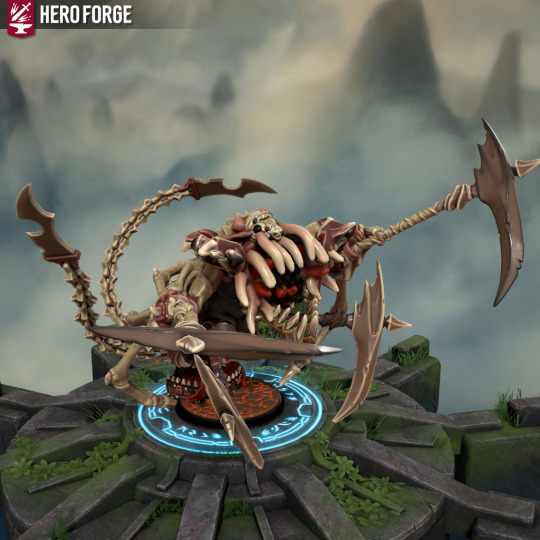
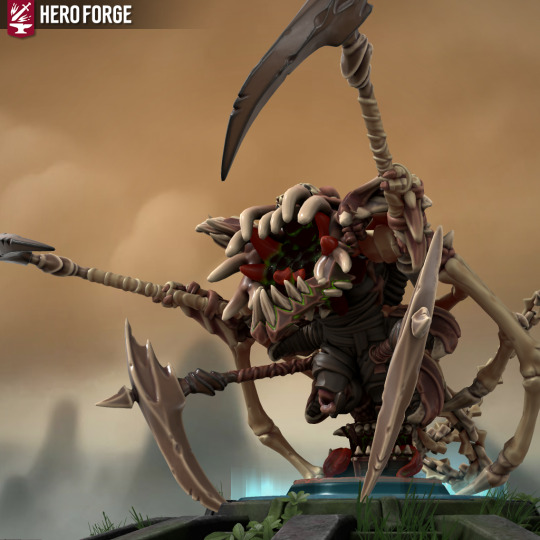
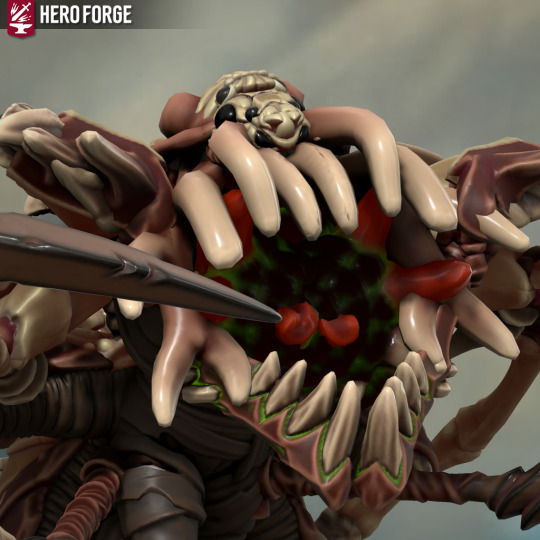
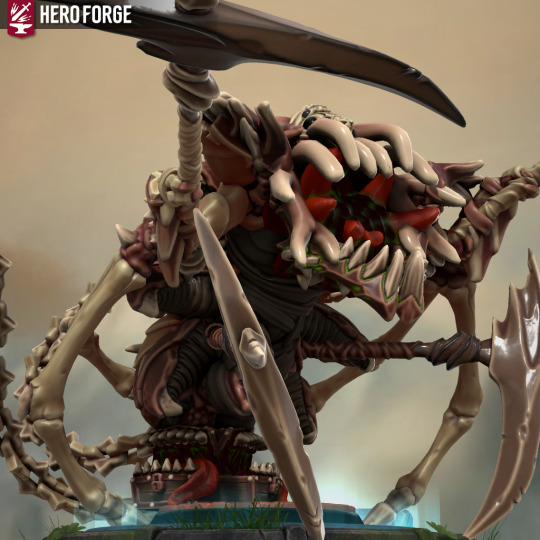
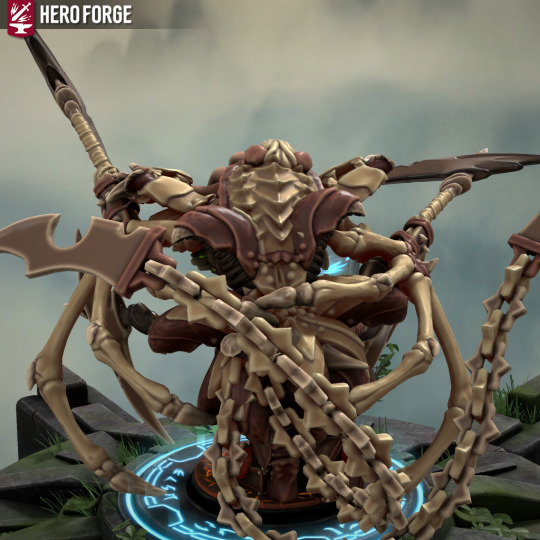
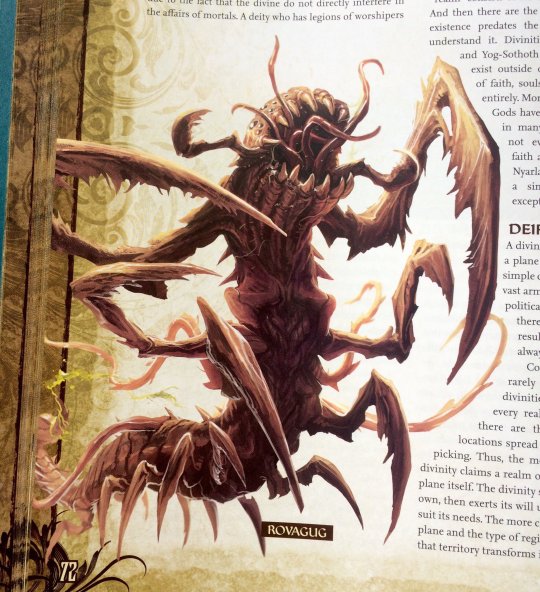
Rovagug, The Rough Beast, The Great Destroyer, Enemy of the Gods, The Unmaker, The Worldbreaker.
all titles of Pathfinder's Chaotic Evil deity of wrath, disaster, and destruction.
basically just his front end; he was tricky to say the least.
one of the first beings in this iteration of reality, Rovagug, as the mightiest of qlippoth lords, gnawed his way from the Abyss into the Material Plane after Asmodeus murdered his brother Ihys and devoured the world where it took place.
after destroying countless worlds after, Sarenrae led a collection of gods (many now dead and forgotten) to battle and eventually imprison Rovagug within Golarion's core in a god-made demi-plane known as the Dead Vault.
even while he slumbers and his cage weakens, he has released a dozen of his spawn, including the infamous herald the Tarrasque.
he is not a good boy.
#Rovagug#The Rough Beast#The Great Destroyer#Enemy of the Gods#The Unmaker#The Worldbreaker#Pathfinder#Chaotic Evil#deity#wrath#disaster#destruction#qlippoth#Abyss#Material Plane#Asmodeus#Golarion#Dead Vault#Tarrasque#Heroforge#paizo#greataxe#rpg#miniatures#tabletop miniatures#Ihys#Sarenrae
23 notes
·
View notes
Text
Timeline of Osirion’s Second Age
See also: Timeline of Osirion’s First Age
-1613-1584 AR Reign of the Lightning Pharaoh, Silkheth I, first halfling pharaoh in Osirian history. He reigns over the city of Tephu and most of the trade along the rivers.
-1584 AR Silketh II, the Night Pharaoh, takes the throne. An assassin by training, he uses his racial and cultural bonds of loyalty to slowly seize control of the thieves' guilds in Tephu's sister city Wati, and establishes some influence in the guild which prevails in Sothis.
-1578 AR Silketh II seizes Wati by subterfuge with his control of its thieves' guilds, and establishes a stranglehold on river trade everywhere above Sothis.
-1573 AR Human pharaohs from the surrounding area, rivals to Silketh II, make common cause and destroy him, his palace, and all his heirs. The Silketh dynasty ends; no other halfling dynasty in Osirion is ever recorded.
-1498 AR The Four Pharaohs, each ruling around a fifth of Osirion, form their Pact and unite the nation.
The Scorpion Coast was under the Cerulean Pharaoh's control, Sothis and the Sphinx Delta ruled by the Radiant Pharaoh, the Asp and upper Sphinx controlled by the Pharaoh of Numbers, and the Crook and Brazen Peaks belonged to the Fiend Pharaoh.
-1442 AR One of the Four Pharaohs contracts a debilitating illness, causing the bodies of all four to begin desiccating. Which of the four was the source is never identified.
-1431 AR The Pharaohs succumb to the illness; their Steward of Sothis, Nethysian High Priest Azaad Allaf, takes the throne as Pharaoh Gebessek I. His dynasty is called the Sothis Dynasty and it lasts two generations before being deposed by discontent generals. The three millennia which follow do not see Osirion break apart into squabbling substates as they did before the Four, but it has no imperial ambitions and is a minor regional power.
-1397 AR Fulfilling a numerological prophecy made by the Pharaoh of Numbers, Volnagur the End-Singer, one of the great Spawn of Rovagug, emerges. The prophecy foretold that it would attack Tumen, which incited the creation of an enormous clay golem defender (which would be better able to resist than Dark Tapestry magic or armies of bound fiends). Because Tumen has already fallen, Volnagur goes elsewhere, probably leaving Golarion entirely and attacking Castrovel.
-1043 AR Tular Seft, after extensive study of the Dominion of the Black, acquires a countdown clock and attempts a ritual to merge with the Dominion on his deathbed.
-929 AR The Osirian governor of Thuvia is assassinated and no replacement is sent. Thuvia becomes independent.
-927 AR Emboldened by the independence of Thuvia, the exiled necromancer Geb claims ownership of a large swath of southern Osirion. Local armies do battle, but the throne is unwilling to commit other armies.
-923 AR A treaty brokered by the mage-princes of Quantium (already an independent city-state) makes their city-state and a large band to its west, most of modern-day Nex, a demilitarized buffer zone between Osirion and Geb's domain. Geb's domain (defined slightly larger than its modern borders) is recognized as independent. Osirion still holds most of modern Katapesh but has no other holdings.
-892 AR Nex takes power in Quantium. He expands it into the treaty zone, which is forbidden to Geb and Osirion but, in a piece of manipulation by the mage-princes, not to Quantium itself.
-885 AR The expansion of Quantium provokes Geb, and he ceases to respect the treaty. The Geb-Nex War begins. The personal rivalry of the two archmages means the war continues for fourteen centuries without interruption. After Nex's disappearance, it abates only partially. Technically, peace is never declared.
-644 AR Pharaoh Osezis II negotiates a pact with the water elementals near the great river, regulating the flooding and expanding the growing season. The begins a period of prosperity and renewed vigor in Osirion which lasts several centuries.
–307 AR The Three Sisters of the Sphinx are complete; the Youngest Sister, An, is founded by Pharaoh Hirkoshek I to house the workers constructing his pyramid.
1532 AR Pharaoh Menendes XXVI is forced into hiding and the Keleshite Interregnum begins. A satrap, vassal to the Keleshite Padishah Emperor, rules from Sothis.
1687 AR The last remnants of the port city of Shotep-Kara, built by the Four Pharaohs of Ascension, are hit with an earthquake and fall into the Obari Ocean.
3 notes
·
View notes
Text
49. Emkrah - Pathfinder
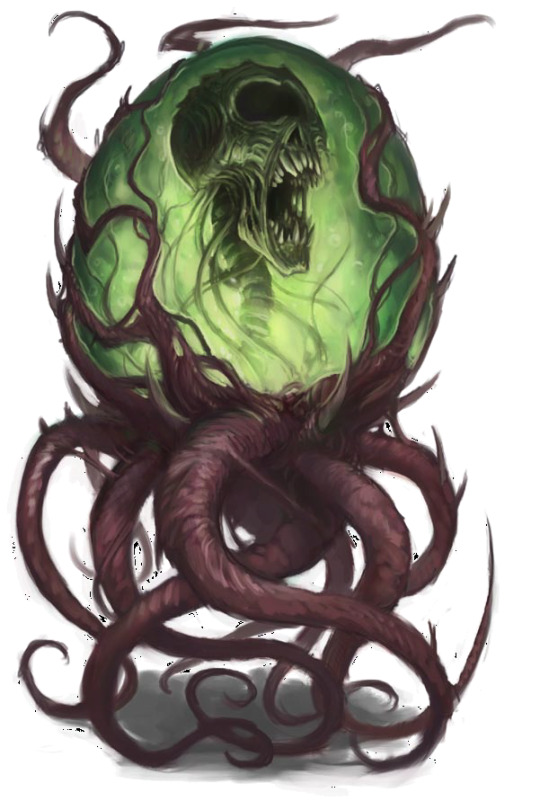
The Emkrah are a little bit more direct than our last post of today. And yet they tie in pretty well to something we’ve already talked about, in that they connect heavily to Rovagug, the destroyer god of Golarion. He’s a pretty basic destroyer god, and in Golarion they constantly creates kaiju like mofes of a wide variety that are called the Spawn of Rovagug. They are nigh invincible and are made directly from Rovagug. To give a slight idea of their intensity, the tarrasgue of Golarion is said to be a spawn of Rovagug. The Emkrah on the other hand are said to also be spawned directly from Rovagug. They are however far less powerful and seem to be more of a passively birthed being than their greater kin. I might even suggest that perhaps that they are sometimes formed out of failed spawn. When formed however, they remain in an egg state until powerful forces of aberrant, outsider, or vermin nature come to give it care, while the egg constantly draws in these potential foster parents. When the emkrah arises, the foster parents job is not done, for while an emkrah has the potential to devour its guardian as willingly as anything else, often times this will instead lead to odd pairings that could go one way or another in terms of power. As emkrah are sacred amongst those who follow Rovagug, it is safe to say that any creature that seeks them out to nurture them is well aware of the needs of the creature and what will need to be provided in order to keep an effective ongoing cult around the creature. Just as the spawn of Rovagug, Emkrah are all of various shapes and abhorrent design, yet another reason to possibly concur a more implicit connection. It is said that Emkrah cannot actually become spawn, but this does not mean that they weren’t still an attempt at such a ritual. The potential of Emkrah as our BMEG arises from their massive variability. Though there is a stat model that Pathfinder gives us, the description leaves us with the possibility of differentiating from that model immensely, possibly in ways that connect to the greater spawn of Rovagug. In addition, we get a great measure of variability in the relation the emkrah might share with its foster parent, who in this case would have to be the lesser to it to make it stay the Big Bad, but not be so lesser as to be just an easy meal. This gives us invariable options to stem from. This connection is also important because the major problem of the emkrah is that it has no way of speaking, in spite of having intellect that may allow for it, and this mouthpiece can serve to better engage us with whatever scheme it has to further the work of Rovagug. At a CR 9, an Emkrah can be the final villain of an early to mid-level questline that first introduces your party to a series of questlines that make up a campaign spiraling around Rovagug.
2 notes
·
View notes
Note
🔮 🗝 🎤 🏖 for the Pathfinder asks?
I haven’t really talked about my babies here yet, so for context: I finished one playthrough with Tuyen, an angelkin aasimar and possessed shaman + bloodrager on Angel path, and I’m on another playthrough with Auri, a daemon-spawn tiefling and plagued oracle on Azata path.
🔮: OC's opinions on magic and the gods?
I picked atheism for Tuyen, because I think atheist is a very funny thing to be in a world where gods are extremely manifest, and especially funny for an aasimar. But Tuyen has also spent much of her life feeling abandoned by her celestial bloodline, and so she doesn’t have any especially fond feelings towards deities. She is much more positively inclined towards spirits, particularly kami, but she does have a fondness for Qi Zhong. As a healer, shaman, and later bloodrager, Tuyen finds magic to be a very useful tool and source of power, enabling her to level the otherwise unfair playing fields she’s found herself in.
Auri spends much of her life as a worshiper of Zon-Kuthon, whom she eventually interprets as the source of her oracle’s mystery and curse. Her curse results in regular bouts of illness and injury, and so her feelings about her own magic are complicated, to say the least. Her religious beliefs are deeply tied to her attempts to cope with these maladies. As such, she tends to hold unorthodox beliefs about deities in general, attempting to see worth in concepts that others find terrible, or at least view them neutrally, as a part of life -- without necessarily having a taste for spreading it herself. Thus, she also favors deities and beings that represent disease, destruction, and catastrophe, such as Nethys, Urgathoa, Shyka, Apollyon, Rovagug, and Groetus. Over the course of the game, she eventually abandons her loyalty to Zon-Kuthon and becomes a worshiper of Shelyn, when her oracle’s mystery changes and shifts mysteriously as a result of the inscrutable wills of the sibling gods.
🗝: What’s one tip you’d give to a new player?
Use the Toy Box mod, and talk to every NPC frequently because they often have new things to say. Which is two tips, but equally important.
🎤: Voice acting! Do you have a favorite performance in game or a voice claim for your Commander?
Areelu’s voice is simply sublime, and out of the companions, I think Woljif’s and Regill’s are my favorites.
For Commanders... I don’t have a particular voice in mind, but Tuyen is sometimes formal or reserved and occasionally long-winded when she speaks. She often slips into a bedside manner, too, speaking calmly and reassuringly. Otherwise, she can be very dry and witty at times. She is fluent in a few languages from growing up in a major trade hub with parents whose families are from opposite ends of Tian Xia, and she is usually navigating between languages in her head.
Auri, on the other hand, is much coarser and harsher, more likely to swear and talk irreverently. She does, however, have a Business Voice that she uses when doing work for her library, where she’s likely to convincingly claim that she is an especially cursed oracle (as opposed to a tiefling), to put clients at ease. She’s strangely compelling and persuasive despite her odd appearance. (CHA caster privilege.)
🏖: What’s your OC doing post game?
Tuyen gathers the angels she poaches from Iomedae (namely the Hand, Targona, and Lariel) and the companions who want to go adventuring with her (which is many of them!) and returns to Tianjing to help muster the aasimars to defend against the qlippoth rift at the country's heart. She establishes a hospital there that is dedicated to rescuing and sheltering refugees from other parts of Tian Xia, and eventually sets up a counterpart to it in Avistan. She and her friends are something like Golarion's equivalent of superheroes, and a spawn of Rovagug numbers among their many foes over the years.
For Auri, the only thing I'm starting to feel sure about is taking the option for her to stay and rule Drezen. Beyond that, we'll have to see!
5 notes
·
View notes
Photo
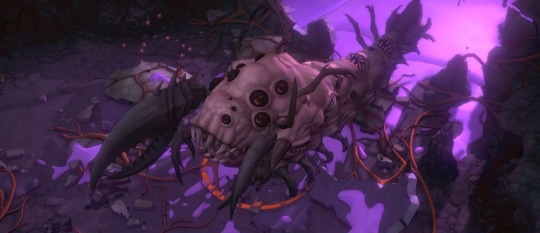
Spawn of Rovagug. I’ll have to come back to it later, because this is very hard fight.
8 notes
·
View notes
Text
Her, with the Gun
Her, with the Gun
An excerpt – from the work-in-progress – of a story starring The Old Wishtwister; brought to you absolutely free, as always, by the fine folks of my Patreon.
Old Wishtwister Shaibriri had been feeling simply awful.
Busted down. Burned up. Dried out.
Wounded. Humiliated. Sick to his very heart.
Hollowed and shelled and left quiet, cold and miserable, the ageless demon sat in the middle of the floor in the basement of a rotting, long-abandoned hunting lodge high in the nameless wooded mountains of furthest Zi Ha.
Light-headed and shuddering, he sat for days upon days and weeks upon weeks, alone. His breaths were ragged, slow and shallow. He was in great pain.
Crouched and aching, the Wishtwister hugged himself in a motionless melancholy. Unsleeping but exhausted, he let wordless hate roil within him deep in the echoing dark. The old fiend occasionally sighed very softly with pity for himself; he otherwise all-but-silently nursed his pain as months crept by and the snow settled in drifts around him. He wept, curled in a heap.
Outside, thin wind howled.
Sometimes the ageless demon touched his tender wounds, wincing and sucking sharp breath over his wolfish fangs, and he thought about death. He flinched, more than once, simply at the reliving of nasty memories and old failures. Icy, oily sweat dripped from his fevered brow.
He shivered, often with hate and sometimes with sorrow.
In the grey fog between two moonless nights, something scuttled across the floor above his basement hiding-spot; a writhing coil of ugly hate spasmed into the world without a blink of the demon’s bloodshot eye, and all was still once again. After a few days, he could smell sweet rot; three weeks later, the stench of the unlucky animal finally dissipated. Thunder could be heard pealing from far-away mountain peaks, and the sound of rain on forest canopy; a season passed.
One bleak morning, the Wishtwister stood with a smile on his face.
“I’m hungry,” said the ancient fiend, simply.
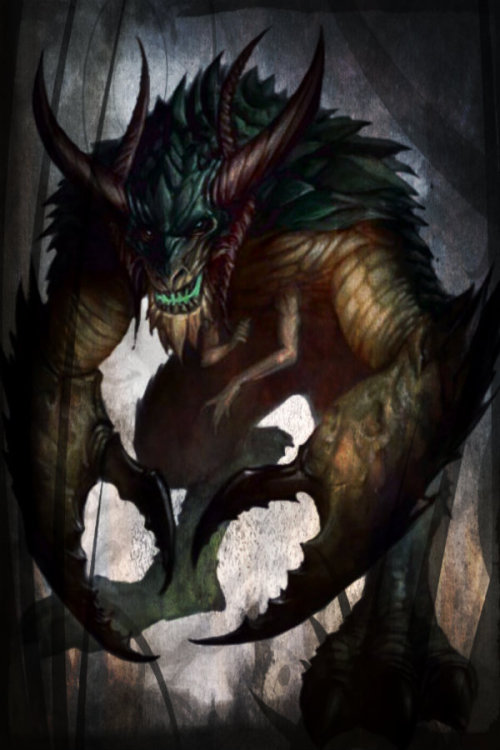
The dank room creaked, and seemed to shrink away from him in sudden fear, and the demon laughed.
“Yes. Yes, let’s have dinner. And dancing, and wine and song; screams and blood! Fire and wailing and jumping and laughter, indeed. Why, let’s make it a date.”
Something small and round, no bigger than the ball of a child’s thumb, clattered to the damp floor as the Wishtwister stood. It was single bullet -- a once-perfect sphere crafted of thrice-blessed cold iron, now pitted and stained with a crimson crust of demon’s blood. It was cold, and misshapen from where it had pressed against the ageless fiend’s heart. It rolled across the floor, making a soft ticking sound, then fell still and spent.
The Wishtwister stretched his long limbs, and cracked his elegant fingers and snapped his sharp teeth; he tried on a warm smile, and found to his surprise that it fit his face perfectly. The great, wicked curling horns which swept back from his thorn-wreathed brow scratched at the high ceiling.
“Yes. You know, I feel better already.”
Then, with a gleeful twist of the mind, Shadibriri was gone.
A cold breeze blew through the empty mansion.
---
The sun was setting as the demon walked through the early summer evening of Quantium a moment later. The warm wind blowing off the bay was alive, deep with heat and salt and the glow of sunset, as Shadibriri delighted at the feeling of his cloistered stink blowing away into the unnatural desert encroaching from the west. The city gleamed and glittered; he wore his best and brightest glamer: all deep purples, livid greens and shimmering gold over skin like creamy chocolate, and tipped his hat at all who caught his eye.
In no time at all, he found the modest apartment of his wizardly friend.
He did not have to knock, or clap, or ring a bell at the wooden doorway -- that was one of the nice things about being friends with a wizard. A silent alarm began to sound, the demon knew; in no time at all, the mage arrived in a huff.
“I’m entertaining.”
Shadibriri shrugged. “Really? I never thought so. Not particularly, anyway; I mean, you’re funny looking enough, I suppose, but your sense of humor is --
“By which I mean that I have guests,” the wizard spat. “Colleagues, over for dinner. What do you want, demon?”
The fiend chuckled. “Spell power, and everything you know about rifles.”
“And what,” the wizard asked after a moment, “does that mean?”
“Well, I’m off to kill a girl with a gun, up in the north; I have reason to believe that she’s an ordained holy warrior of Iomedae or someone similar, and I would like to have her blasted into bits from several hundred yards away. Or whatever the best distance is, in your professional opinion.”
The mage stroked his thin goatee, suddenly curious. “The best range on the most commonly-produced rifles available in Avistan? Less than half that of a well-thrown fireball, in all honesty -- firearms are weak peasant-magic novelties, really.”
“Agreed, without prevarication,” the demon said with a grin.
“Hmm. But why my spell-power, instead of your own?”
“The target,” Shadibriri allowed, “proved both uncannily and frustratingly resistant to the better part of my offensive mystical repertoire, much to my chagrin. And then she shot me. Several times.”
“Ah,” the mage said, gazing into the early-evening street. “You presume her to be warded against demon-magic. So a true holy warrior, then, and not some fat local potentate with an exotic, gilded blunderbuss and a parish named after him?”
“A hero,” the ageless fiend sighed. “Champion of a just and righteous cause of some type or another, of course; knight-in-shining-armor sort of stuff -- quite literally, in her case. I still remember my last one of those; gods, how he struggled at the end!”
“How unpleasant,” said the wizard, simply.
“Yes. Good for a bit of a laugh, as always ... but I find I’m ready to put this little adventure to bed. Coming with me?”
The mage frowned. “I’m not sold. What, precisely -- other than shoot you, of course -- has this lady hero done to earn your particular enmity?”
“Is that not,” the demon asked with stunned shock, “quite enough? She shot me, as I said. Several times! With blessed & demon-warded bullets!”
“Hmm. Unlikely -- those weapons are infamously slow to load.”
Shadibriri darkened his gaze. “Well, I was there; I, for one, found that she had no problem firing upon me with both great speed and deeply unpleasant accuracy. At her touch, bullets flew from her bandolier into her rifle with an alacrity matched only by the speed with which they thereby exited in my general direction.”
The mage shrugged. “Some have a ken for swift firing, I suppose, just as some have a talent for the harp, barn-dances or the loom. So she shot you several times; what of it?”
“I didn’t like it. Once was enough to get me angry; the last one nearly undid me.”
Rolling his eyes, the wizard looked back into his house before continuing. “And why did she do that?”
The demon smiled. “Well, in her defense, I was killing an awful lot of people at the time. Striding around a village whilst it was on fire, pretending to be one of the Spawn of Rovagug, if I’m being honest. Tore down most of a church, actually, and threw the whole altar right in a river. Always wanted to see if I could do that. Kicked a vicar right in half. Then she yelled at me, and then when I turned around I got shot. And then again, and several times more.”
“You really are a terrible human being, do you know that?”
“Oh, I’m neither. I’m the very model of roguish charm, for one -- and if I was ever a human, I’ve long forgotten about it. Now, what can you do for me?”
The mage frowned, a look Shadibriri was well familiar with, then shook his head in an emphatic negative. “Nothing. I’ve no desire to stick my nose where it doesn’t belong, in general, nor any interest in facing off against a gun-toting northerner paladin in full plate, in particular -- especially not one that has already bested you. Now, as I may have mentioned, I also have dinner guests, so--”
“She got lucky.”
The wizard rolled his eyes again. He was getting good at it. “Be that as it may, she and I have no quarrel, and I dare say that you’re mad to face off with her a second time. Furthermore, any woman capable of shrugging of your not-inconsiderable barrage of unholy death-magics would hardly be expected to succumb with due haste to anything that I might unleash upon her.”
The Wishtwister smiled sweetly. “Like you said, perhaps she’s only warded against demons -- and not against the spells of you mere mortals. Perhaps you can disintegrate her while her back is turned.”
“A gamble I would not hastily wish to take, and certainly not wager at the cost of my life. Now, if you will excuse me, I’ll rejoin my dining companions.”
Shadibriri folded his hands. “You do know that I would reward you greatly, yes? For help in this endeavor?”
“You’re offering me a wish?”
“Yes. Sans twist.”
The mage blinked. “Good gods -- this girl has really gotten to you, hasn’t she?”
“Do I hear interest in your voice?”
“Yes. Meet me after dinner. Where we met the first time.”
---
They met in a dark alley by the waterfront, the wizard and the demon.
“You smell like death.”
Hunched in the pitiless black, the Wishtwister smiled. “I think I killed a fox or possum or something by hating it so hard that it exploded. Might have been a deer. It was making a bit of racket while I was feeling ... thoughtful. Months ago, and I haven’t washed yet.”
The wizard sighed. “Let’s get on with this, then. What do you know about the woman you’re up against?”
“She’s very pretty, and ... “
“Oh, is this a sex thing?”
The old demon suddenly sat up straight. “Why, you know -- it might be! Since you mention it, that very well could be the case. I quite like human women, I’ve found; I would gleefully impregnate half of the human females you might care to name. Perhaps I’m simply smitten!”
“I would be very careful with that, if I were you.”
“Hmm. I’m now imagining us romantically intertwined. Things would no-doubt get broken -- a small shed, perhaps, and a family and maybe a church. I like the idea.”
---
The demon giggled. “You know, I once knew an assassin who had never been in a fight?”
“Really?”
“Well, that was his claim. I think it much more likely that he had simply never won a fight; he certainly never took a swing in anger ... nor even in self-defense, that I know of. He could tell you quite a bit about knives, but I don’t think he ever used one except in surgery -- which, I suppose, includes autopsies.”
“Fascinating.”
“I agree! It was a real delight to watch him work -- he claimed that he didn’t like to look his clients in the face when they died. He was much more of a puzzle-solver than a brute. I liked him - a real passion for the craft. Very good at pushing people off of cliffs and into traffic.”
---
This was a dangerous gamble, but it was going to be worth it -- if it paid off.
He stood in front of the black monastery for three days, letting the cold wind of the Menador Mountains blow past him. He hummed to himself, and rocked back and forth on his ankles, and twiddled his thumbs.
On the third night, a wizened abbot carrying a single black candle came to the door; he gazed at the demon with a look of calm disgust.
“Hello,” said the demon with a smile.
“You are unwelcome here,” said the priest.
Shadibriri smiled. “I’m offering you -- and your temple -- a wish. That’s all. You know what I am, and you also know that I mean you no harm. Well, no more than I mean anyone else.”
The old abbot frowned. “What do you want?”
“I want to kill a woman, far to the north. She is a priestess of Iomedae, and warded against me; she carries a gun. I request the use of one of your assassins. One who can deflect bullets fired at him.”
“Will he be required to kill this woman for you, demon?”
“I’m hoping to use him as a distraction, actually.”
---
“What do you think it is that he saw?”
The thin, pale sword-saint looked at him blankly. “Hmm?”
“Zon-Kuthon. The Dark Prince. What do you think it was that he saw, which drove him up the wall and over the edge, out in the blackness between planes?”
“I do not know.”
“Well, of course you don’t know. But it’s an interesting thought, isn’t it? What did he see that made him unravel? What mysterious and inexplicable force made him what he is today?”
“It is,” said the holy-warrior after a long, calm moment, “utter heresy to ask such questions.”
“Yes. That’s one of the reasons I delight in asking it.”
---
“A wise man once said ‘A moderately bad man knows he is not very good: a thoroughly bad man thinks he is all right.”
“I like that!
“He continued: ‘This is common sense, really ... Good people know about both good and evil: bad people do not know about either.”
---
“Did you really think I wouldn’t recognize you? I’m a tracker -- and you leave very specific tracks.”
“So, you’re the sheriff, now. Good for you.”
---
“After this, I’m riding to the Worldwound. And I’m taking guns with me.”
“Ah, yes? Frightfully dreary place; I certainly won’t be joining you.”
She arched one eyebrow. “I’m a little surprised that you aren’t more concerned.”
“Concerned? About what?”
“I’ll be doing my best to slay demons, obviously.”
“Oh, that! Yeah, no, I don’t care what happens to them. Their plans have absolutely nothing to do with me, and I don’t like any of them. More power to you, I say.”
---
She couldn’t see him. That was good.
“You know,” he whispered in her head, “I do really quite respect you.”
She laughed out loud at that. “Is that so?”
“Oh, yes! No kidding, no lies, no taunts -- I think we’re beyond all that by this point.”
“You respect me,” she said with a frown. “Why is that, may I ask?”
“Because you, like me, are sane. And I’ve noticed that sanity is at a real premium these days.”
“Sane?”
The demon smiled. “Oh yes. You can actually see the big picture, which is rare enough. And of the few who can see it, most people snap. When someone gets a good glimpse of the total shape of things ... well, when that happens, a lot of folks shut down completely. But not you -- you’re looking out for number one.”
“I wouldn’t call what I do ‘looking out for number one,’ precisely.”
“Oh, but you are! Let’s think like sane people for a moment: eternity is much longer than non-eternity, I’m sure you would agree?
She nodded, her sharp eyes scanning for him in the wooded dark. “Yes.”
“And since it’s going to be so damn long, it’s best to have the best possible afterlife, yes?”
“I suppose.”
“People’s afterlives are a lot longer than their lives, after all; a whole lifetime is nothing but a mustard burp in comparison to eternity. And nobody treats it with any kind of sanity.”
“What’s your point?”
“Well, most people don’t really believe in the Abyss. They don’t actually believe that it’s an actual place that they might actually go to. Not really. Not like ‘up the road to the bakery’ level of real. If they actually thought it was real, people would spend every moment of every day doing anything they could to not go there. Not even for a minute, let alone for all eternity.”
“That’s a scary way of putting it.”
“I’ve been to the Abyss. It’s quite a bit scarier than I’m making it sound. But the really sick part is that every mortal creature, in this world and in all the others, is going to wind up dead at some point in the future. In the relatively near future, by my standards; sooner than that, if I get an opportunity. There’s a chance, I suppose, that you’ll never go up the road to the baker’s ever again ... but at some point, you are going to be in the afterlife. It’s truly and finally inevitable. No exceptions.”
“People know that.”
“Do they? Do they really? Then they behave as if they don’t, which is madness. There should be no one in the whole world under the impression that murder is a good idea, or that it can be gotten away with -- and yet murder happens nonetheless. There’s literally no such thing as a perfect crime; the soul suffers for the sins of the flesh, and souls burn longer than stars. It’s fascinating to watch, and I love it. People are fundamentally insane.”
“And you’re not?”
“No, not at all! I’m already in my afterlife. Nothing wrong with trying to have the best one, I should think. But I respect you, because you’re working a lot harder to make a go of it.”
She sighed. “You respect me because you think I’m doing this -- all of this -- trying to get into heaven. And, of course, that’s what you would be doing, if you were still mortal and capable of being redeemed?”
“I’m not saying you’re cynical, my dear. I’m not just being rude to you for the sake of rudeness. As I say, we’re well past that point. You are to be admired: neither conniving nor ambitious, but willing to put in the work. I’m saying that you’re going about existence -- living life and planning for the afterlife -- sanely. There are only three kinds of people you can’t corrupt; did you know that? Opposite kinds of people, really.”
“How so?”
“Well, as a very smart little boy once said, ‘The way spies turn people is, they get them to commit a little sin, and then they use the little sin to blackmail them into a bigger sin, and then they use THAT sin to make them do even bigger things and then the blackmailer owns their soul.’ -- there are only three ways out of that little trap.”
She sighed. “And they are?”
“You don’t want to guess?”
“No. This is your villainous monologue moment; go crazy.”
“Fine,” the demon pouted. “The three kinds of people you can’t corrupt are simple: the first are the stalwart. Those rare folks will never commit a single little sin. You can’t trick them into accepting the gift of something stolen from an enemy or an unrequited love; you can’t get them to break some small promise or utter some small treason. That would be you.”
She gave a wry chuckle. “I’m hardly incorruptible.”
“Ah, then maybe you’re the second type: the penitent. They’ll fess up as soon as they make their first mistake -- or at least before they make their final misstep -- and simply refuse to be dragged any lower. They’ll demand to be allowed to atone and martyr, publicly weep and gnash their tear and rend their garments in sheer shame at their own wrongdoings ... and woe be on to anyone who stands in the way of a true penitent getting revenge on themself.”
“And the third?”
The demon smiled. “The brutal psychotics. They don’t respond to threats of blackmail, because they’ll willingly let their name be tarnished. They wear the stains and scars of betraying civilized rule like war paint. When someone goes to push them into the Abyss, they dive.”
She frowned. “Do they?”
“Yes. Everyone else responds to treachery; the line of folks who are simply waiting to be blackmailed is unbelievable.”
---
She smiled. “A very smart man once wrote, ‘Many have stood their ground and faced the darkness when it comes for them. Fewer come for the darkness and force it to face them.’”
The demon smiled back. “Yes. As he also said, ‘It is a hard life, sometimes lonely, often short.’”
---
“And where,” the demon asked, “are you of to after this? Assuming you survive this, I mean.”
“Home. To my wife.”
“And your god ... approves of this coupling?”
She smiled, still scanning for him. “I cannot say as I know my god’s specific feelings on the matter, I’m afraid. It’s possible he’s slightly miffed about it, as is my father. But I’m certain we can work that out -- it’s what loving families do.”
---
“This is why you disappoint me, little devil -- you’re a technician. A cog; a conscripted soldier, a punch-clock performer of mechanical duties. You have no love of what you do. I, on the other hand, am a born artist.”
—
NOTE:
This website uses trademarks and/or copyrights owned by Paizo Inc., which are used under Paizo’s Community Use Policy. We are expressly prohibited from charging you to use or access this content. This website is not published, endorsed, or specifically approved by Paizo Inc. For more information about Paizo’s Community Use Policy, please visit paizo.com/communityuse. For more information about Paizo Inc. and Paizo products, please visit paizo.com.
10 notes
·
View notes
Text
The Great Game: Outer Gods and Great Old Ones
As the deities that are most physically tied to the Material Plane, it is perhaps unsurprising that the various entities collected together as “Outer Gods” and “Great Old Ones” have been paying attention to the Great Game. The allegiances of some of the prominent members of these pantheons are as follows:

Abhoth
The Unclean God is patron of disease and fecundity, and knows how these two things are tied together. More are born than can survive, and many of those that die fall to disease before anything else. As such, Abhoth is well versed in ecology, and knows that Lamashtu is overpopulating Golarion with her monsters. Abhoth’s followers seek to spread plagues among monstrous species in order to keep their numbers down, and as such, Mormo counts Abhoth as an ally.
Azathoth
The Primal Chaos does not seem to have noticed the Great Game, or much of anything that has happened on Golarion in centuries. This is probably for the best. If any of his attention were to be turned onto the conflict, it could easily become a disaster for both parties…something that Nyarlathotep is hoping for, and working to make happen.

Bokrug
The Water Lizard fondly remembers Mormo from before the evolution of true mammals, and they have hunted and sparred together and even mated in the past. Bokrug may be difficult to rouse from his slumber, but his ire is terrible when provoked, and is likely to be directed at the followers of Lamashtu.
Cthulhu
The Dreamer in the Deep has dreamt of Golarion, and one or two of his star-spawn have come there. But he cares not for the Great Game; he has his own stars that need to be right once again. A star-spawn of Cthulhu is a dangerous agent of its own right, and one more likely to support Lamashtu than Mormo.
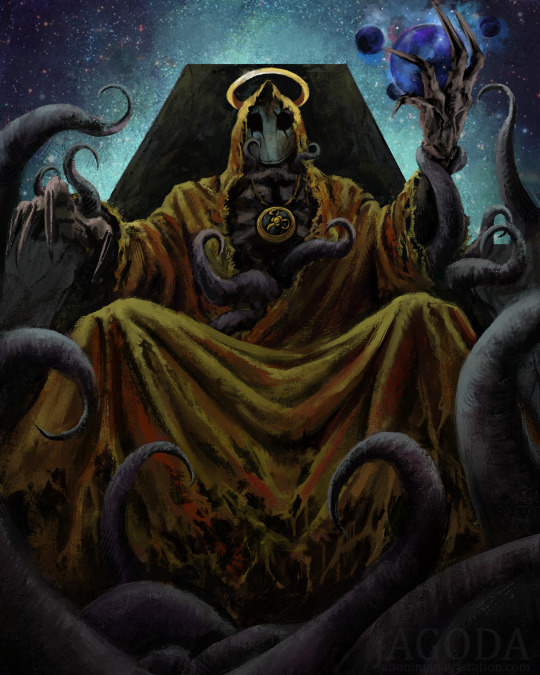
Hastur
The King in Yellow respects Lamashtu and her ravenous appetites. Although he has his own plans to absorb chunks of Golarion, or the whole world if he can, into the Nightmare Kingdom of Carcosa, he is at least nominally on the Mother of Monster’s side. As long as their cultists can keep sharing the same sybaritic festivities.
Ithaqua
Ithaqua is more concerned with consuming anyone on either side that he can sink his talons into. The Wind Walker is slightly more favorably minded towards Lamashtu than Mormo, but any relationship between their cults is likely to be a tenuous one that could break down into ravenous hunger at any point.
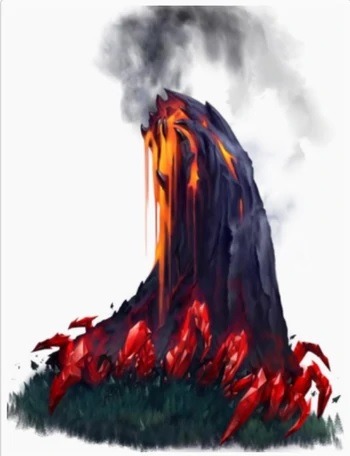
Mhar
Mhar wants off of Golarion. He sees a change in the status quo as the best way of achieving that goal, and is resentful of lamia clerics of Lamashtu for helping Karzoug the Runelord to build a palace on his surface and deface him. Mhar’s release would likely be devastating for Mormo’s goals of making Golarion a richer and more diverse ecosystem. But on the other hand, volcanic ash and lava rock makes for excellent fertilizer, and his eruption might not be as destructive as he hopes it will be.
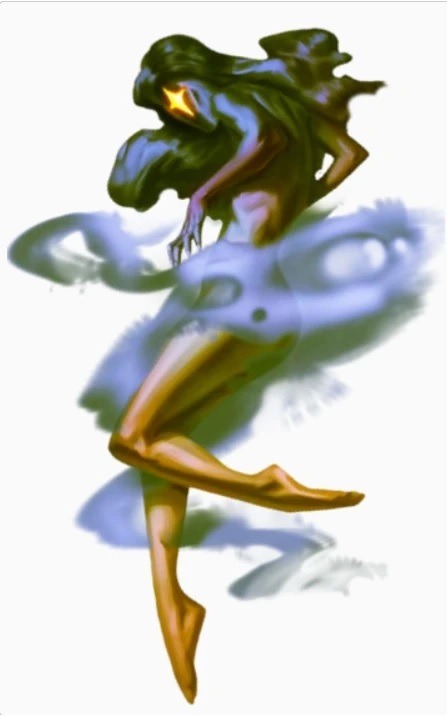
Nhimbaloth
As a devourer of souls and a corrupter of wild things, Nhimbaloth is an ally of Lamashtu. Of course, she does respect Mormo’s goals of eating Lamashtu as a fellow apex predator. But Nhimbaloth thinks that the Goddess of Predators is too arrogant and needs to be taken down a peg. Nhimbaloth would happily eat Mormo herself if given half a chance, and for that reason, Mormo keeps a wide berth of Nhimbaloth’s home world, Voidbracken.
Nyarlathotep
The Crawling Chaos is delighted by this galaxy spanning conflict, and on the surface is playing both sides. Lamashtu is his real dog in the fight, as he views Lamashtu as being more likely to lead Golarion to ruin, cracking open and releasing Rovagug. That would be a fun show to watch, seeing how the Rough Beast would react after eons of imprisonment. The Mask of Nyarlathotep that is most actively involved is the Black Pharaoh, whose cults are pushing technological advances into the hands of demon cultists and dangerous maneaters.
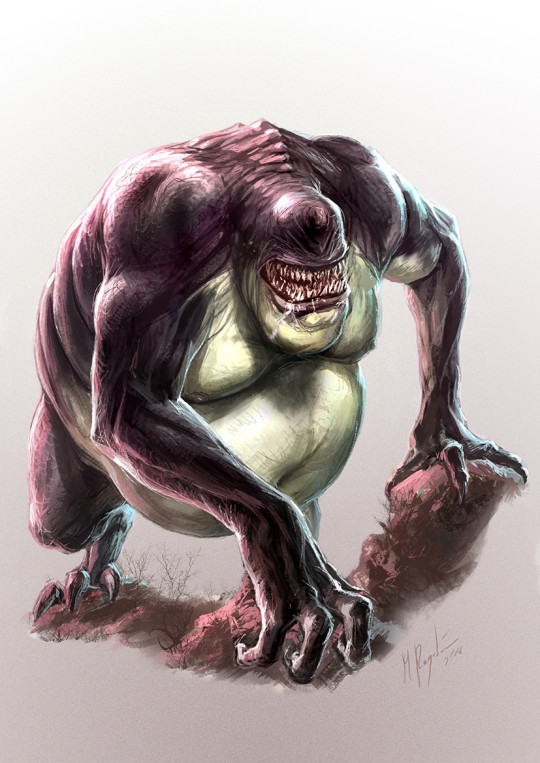
Orgesh
The Faceless God is technically on Lamashtu’s side, although not by any direct aiding or abetting. Orgesh wants to fight Mormo himself. And is sending his chardra to pick fights with her worshipers, and is gunning for her most powerful servitors himself, in the hopes of getting Mormo’s attention. Worst case scenario, Orgesh will be killed and be able to respawn on another planet. Unless Mormo gets sick of his interference, and starts doing research on a way to kill him for real before setting her sights higher.
Shub-Nugganoth*
The Goat of the Woods views Lamashtu as a kindred spirit, and the two of them have indeed collaborated on the spawning of horrors in the past. They are doing so again, notably through the personage of one of the Goat’s most powerful mortal worshipers in Avistan, a fleshwarping-obsessed alchemist named Doctor Agatha Shiny. Doctor Shiny and her creations are actively hunting down Mormo’s allies in order to transform them into blasphemous horrors, or just murder them.
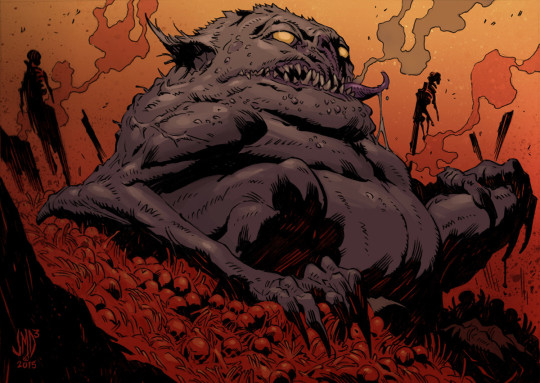
Tsathoggua
Saint Toad knows what it’s like to be forgotten and abandoned. He is a supporter of Mormo, if only because she’s the underdog in this fight, and Tsathoggua has a soft spot for underdogs, as much as he would deny that. Mormo knows that the Father of Night is a fickle and somewhat dangerous ally, so doesn’t rely on his help, but does appreciate his guidance and wisdom.
Yig
The Father of Serpents calls Mormo “sister”, and the Goddess of Predators calls Yig “brother” in return. This may be an actual genealogical relationship, it may not be. But Yig is among Mormo’s closest allies, and the two are active collaborators. Those colonies of serpentfolk who worship Yig are hotspots for burgeoning cults of Mormo, as they see the two ophidian Old Ones as a way to reclaim some of the lost glory of the Age of Serpents without relying on the increasingly unstable Ydersius.
Yog-Sothoth
The Key and the Gate views things on a vast, cosmic scale, even more than the other Outer Gods. As such, the safety and long term stability of the galaxy is his highest priority (after all, it has to collide with another galaxy in approximately 1.2 billion years, and then enough of it has to be around to decay into degenerate matter as the universe shifts past its stelliferous era. So anything that dramatically accelerates that process, or might get large portions of the galaxy pulled out of the Material Plane altogether, are not ideal outcomes for Yog-Sothoth. As such, he supports Mormo, but is doing so in a subtle way—opening portals in the right places, weakening planar boundaries—rather than sending his children to fight en masse.
*This is the name I am going to be using for that particular Outer God in the future. Clearly the same entity that has been developed into a character by Mythos authors over the last 100 years, but doesn't have a racist slur built into the name.
#the great game#age of monsters#cthulhu mythos#outer god#great old one#azathoth#yig#yog-sothoth#bokrug#hastur#nyarlathotep#shub nugganoth#orgesh#mhar#pathfinder rpg#pathfinder 1e#lamashtu#mormo
175 notes
·
View notes
Note
I just read your post about daemons, and it got me thinking... for all their power, and the horrifically real threat they represent for all that lives, aren't daemons ultimately the biggest losers of them all? All they are, ultimately, is empty hatred and nihilism. "Life sucks and then you die, everything is pointless, so let's just erase it all and be done with it". Heck, even the freaking sahkil get something out of their evil. Daemons get nothing in the end.
Correct! And that's the inherent problem with their Nothing In Life Matters philosphy as a whole: it makes them unlikable losers.
Though, to be fair, the last daemon alive if their omnicidal plans ever succeed gets the satisfaction of being the last thinking being in all of creation and can revel in the silence and emptiness for a while. You know, before their self hatred surges back to the fore and they blow themselves up and shut the book on the cycle as a whole.
There's also the unfortunate and amusing fact that their very mission is impossible to ever succeed. Even ignoring the Outer Gods and Great Old Ones--who predate the concept of death and thus are not bound to its rules--you have the Infinite Abyss, the chaos of the Maelstrom, and the living ideas in the Astral Plane... And, of course, Rovagug and his Spawn. There exists life the daemons simply don't have the means to destroy.
Their overall end goal as a species is impossible to achieve.
21 notes
·
View notes
Text
Pathfinder headcanon: there are “Rovagug skeptics” on Golarion. They are most common in Taldor and its former empire and come in two flavors.
Soft Rovagug Skepticism: Rovagug certainly exists, and his role in the world’s early history was pretty much what the usual stories would tell you, but his relevancy to the lives of modern humanoids has been much exaggerated. The Church of Sarenrae likes to exaggerate the threat Rovagug and his cult pose because he’s their goddess’s traditional arch-enemy, but let’s look at it logically - who the hell, besides a handful of edgelords too small and disorganized to be any kind of threat at anything beyond a very local level, would want to worship an omnicidal misanthrope who requires you to break your own stuff? Those overcaffeinated dervishes down in Qadira just need a big bad morally unambiguous archnemesis as an outlet for their repressed hostility from having to be nice all the time...
Hard Rovagug Skepticism: How do we know Rovagug as he’s commonly portrayed even exists? Awfully convenient he was sealed away in a private demiplane before the dawn of civilization, isn’t it? How do we know the so-called Spawn of Rovagug aren’t just renegade high-level magical experiments or the mistakes of other gods? The world is full of big scary monsters that aren’t the alleged descendants of an imprisoned god of destruction. How do we know the alleged “corruption of Gormuz” isn’t just Sarenrae making excuses for her own failure to properly guide her followers and loss of temper? How do we know this isn’t all some plot by the aboleths?
3 notes
·
View notes
Text
Didn't sleep properly last night because I made the mistake of trying to fight the Spawn of Rovagug and the very look of that thing freaked me out.
4 notes
·
View notes
Text
Creature Corner: Magical Beasts part 3
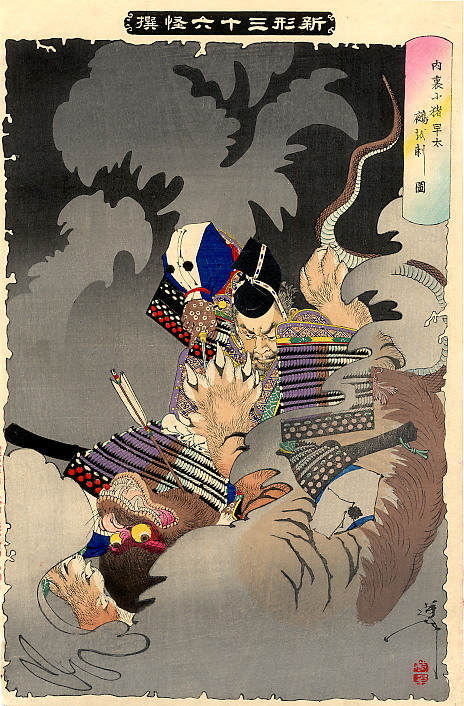
Foes
Magical Beasts are perhaps the quintessential “monsters” of mythology, filling in the gap between the otherworldly, the undead, and the draconic. Is it any wonder they can make such iconic foes?
Perhaps the most basic magical beast foes are those that are either superior versions of ordinary animals, such as worgs, winter wolves, mobats, and the like, creatures both exotic and familiar, and perhaps bearing supernatural intelligence.
There are also those that are clearly not of our earth, bearing the stain of foul magic. Owlbears, bulettes, ankhegs, remorhaz, various giant worms, phase spiders, and more, strange beasts that can prove to be fearsome encounters. These can fill alien worlds, or help to illustrate exactly how different your game world is from Earth.
Of course, no discussion of magical beasts could go without mentioning the role of mythology. Everything from the chimera to the almiraj of Indian folklore to the pipefox of Japan to the phoenix, to the manticore to the hydra, and so on and so forth in a cavalcade of the multitudinous cultures that fill the real world in both past and present. Indeed, such monsters can be used to not only tell the players that they are off the map, but also in nostalgic places, particularly if they are fans of Ray Harryhausen.
With that in mind, while all creature types can benefit, the mythic rules can turn a magical beast into a high adventure legendary encounter. Such beasts likely mirror many legendary stories by making the legendary beast a one of a kind, or even the mythic progenitor of entire species of monster. Even without mythic rules, certain monsters have powerful variants, or could be modified to create equally fearsome encounters with living legends.
At the upper end of magical beasts, we see the likes of behemoths and kaiju. The former are massive engines of destruction, the living embodiment of the wrath of the gods, should they ever be unleashed. Meanwhile, the majority of kaiju are magical beasts, and are even stronger than behemoths or even the Spawn of Rovagug, including the tarrasque, and have no masters. These beings are like unstoppable engines and likely aren’t meant to be fought directly by most parties. Such beings are more akin to natural disasters, the collateral damage of which might serve as the basis for an adventure, as would stories about exploiting the quirks in kaiju personalities to turn them into allies, or at least point them in the direction of equally dangerous threats and hope or the best.
This is just a taste of the themes you can explore with hostile magical beasts, but there is more to be discovered! Tune in tomorrow and see me talk about how this creature type can be used to inspire all sorts of characters!
13 notes
·
View notes
Photo
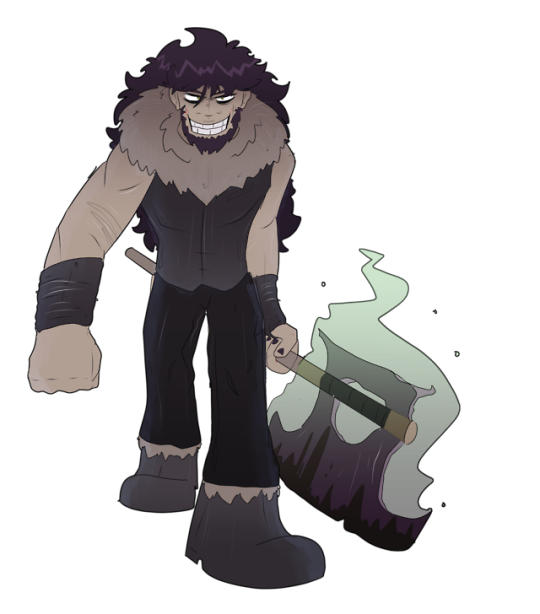
Sera, a Cleric of Sarenrae, and Anatole, a Paladin of the Sun Goddess, stood stock still as the sound of an approaching figure in the woods became audible. Sera looked around. “Be on guard. I feel we may not be alone.”
"Most observant, my friends. Most observant." came the gritty response. Anatole's hand went for their morningstar, eyes narrowing. "Show yourself." They called, shifting slightly to be in front of Sera. "I would prefer to avoid a fight."
A figure emerged from the wood. He was tall, built like a gorilla- with a shock of black hair that splayed messily down past his shoulders and burning golden eyes. A wicked toothy grin was spread across his lips, and you could see that wire wrapped around his forearms. And behind it all, on his back- that terrible, terrible axe. "I have a lot of names. Which do you want?"
“Do not come closer, or I’ll be forced to draw my blade,” Sera says, clutching her sheathed weapon.
The figure walked closer. "At birth I was known as Zurath Huizhast. But honestly... don't you find names pointless? It's a label, when really, you should remember someone for their face, their voice- and what they can do." To this reply, the two holy fighters raised their weapons in preperation.
"Whoa, now." Zurath raised a single hand. "None of that now. I promote an alternative lifestyle. One where..." he cracked his neck. "We as a society can reinvent ourselves, with some outside help. And to do that, I believe- requires a full reset. Perhaps even a total wiping of the slate. Tell me, my friends- I need some help with a quick ceremony. In my foolishness, I didn't bring enough offerings for my deity. I can tell by your robes that you're all holy folks. I am too, if it was difficult to tell. Who is your god?"
“The Dawnflower, Sarenrae. Goddess of sun, redemption, honesty, and healing. I don’t suppose you worship the same goddess as my friend, or I?” Sera inquired.
"Oh." the shaggy stranger looked disappointed. "Your God isn't real then."
Sera gripped her scimitar. “How dare you?” Anatole, however, tilted their head. "And who is your god?"
"Don't get me wrong. I am sure that Sarenrae exists." Zurath yawned. "But she is no deity. A god should be a creature that has been around since the dawn of creation, not some pretender who claims ownership of the sun without even having spawned it. My goddess... my goddess is a true deity. A goddess who has existed long before any of this universe even existed, and shall continue to do so- when we are nothing but cosmic dust in some new infant universe- but by her grace, we will be given the gift of joy. The power to rewind and become what we once were, before your pretender gods took their place, before the spider Rovagug even breathed- the flailing, carnal chaos that once inhabited this world when the universe was new. My goddess is the goddess of life, the goddess of birth and death. My goddess is the Black Goat in the Woods. My goddess is the mother of a thousand young. My goddess... Shub-Niggurath." he shrugged, slowly retrieving his axe. It's huge. It catches fire, and immediately hisses as the edges of the blade seem to drip oil that corrodes as it lands..
Sera was afraid, but would not let herself falter. “You’ve gone mad, letting the whispers of the Dark Tapestry take you.” She lifted her weapon. “But I shall set you free.”
"You never answered my question." Zurath chuckled. "Won't you help me with my offering? All I need is... your... blood."
And with that, Zurath Huizhast lurched forward, and with his flaming, corrosive blade, mowed Sera down, her spine severing and scorching as her wound was instantly cauterized and eaten away by his axe.
Sera gasped in pain, spitting up blood as she falls to the ground, not dead yet. She always was a little more perseverant than most. “You’re—“ cough, “a bastard. And you’ll rot in hell the moment you die. May Sarenrae’s light—“ cough, “Damn you.” She held her scimitar tightly in her hand, tears welling up in her eyes. It hurt, more than anything she had ever felt before. But then she saw the light, brighter than the pain. “I’m— so sorry, Anatole. R— un—“ she sputters, and her body falls, as she follows the light.
"I love it when they keep talking." Zurath sighed, picking her top half up from the ground by the wrist, having split her body like a twig now. "Like a chicken with a head that's been cut off. It took a lot of work to perfect that technique." he licked some of the blood, and shot a glance at Anatole. "You there. Run home. Tell everyone that Chaos comes to Caliphas."
Anatole just.... stared. Expression blank, face stoic. Then they took a step back, and then another, staring up with their wide owl eyes at Zurath. They knew they were not ready for this fight, but they refused to let the adrenaline rushing through their veins make them a coward. Anatole continued their steady backwards advance, and then once they were well out of sight of Zurath, they turned and force themselves to walk calmly home. As Anatole fled back to Caliphas, they could hear the rumbling song of Zurath, like a lumberjack passing time as he sang: "Iä! Shub-Niggurath! The Black Goat of the Woods with a Thousand Young! May she descend upon mankind and devour the unworthy!"
Join CALIPHAS: CITY OF SHROUDS, an open-world roleplay Discord set in the capital of Pathfinder’s Gothic Horror kingdom, Ustalav! With a thriving community, guides for lore and character creation and more, it’s the perfect server for people who’ve never played D&D before and want to try it out to veterans of the Pathfinder system!
| Join today! | Art by @derryzumi | FAQ |
5 notes
·
View notes